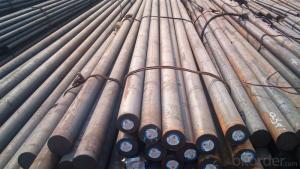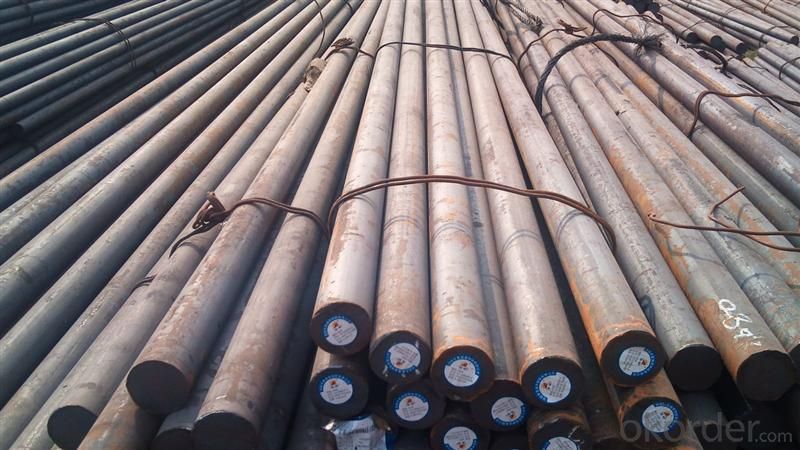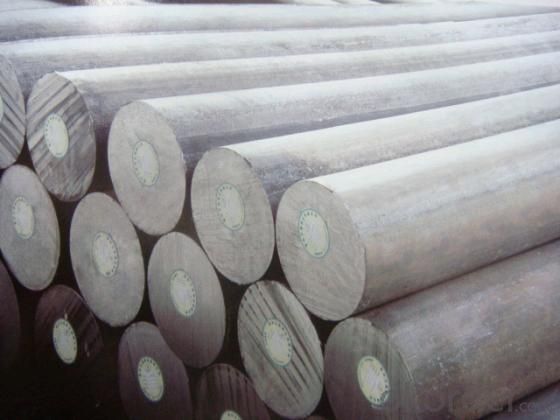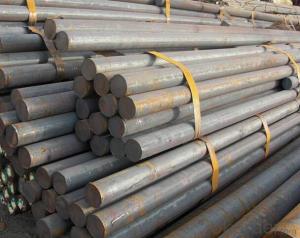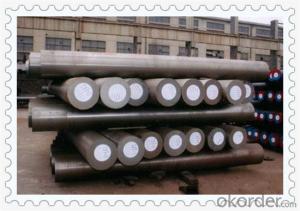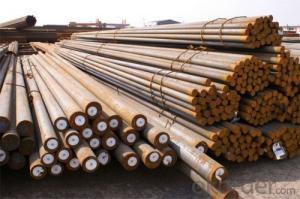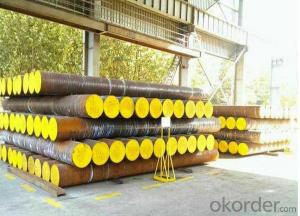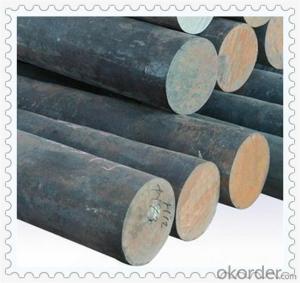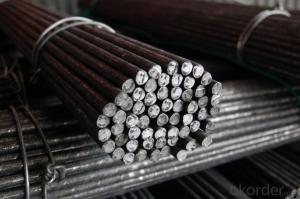Special Steel Scm440 Aisi 4140 Steel CNBM
- Loading Port:
- Tianjin
- Payment Terms:
- TT OR LC
- Min Order Qty:
- 25 m.t.
- Supply Capability:
- 50000 m.t./month
OKorder Service Pledge
OKorder Financial Service
You Might Also Like
Specification
Special Steel Scm440 Aisi 4140 Steel CNBM
Product Description:
1.Dia: 10mm-300mm
2.Length: 3000mm-12000mm
3.Process: EAF + LF + VD + Forged + Heat Treatment (optional)
4.Delivery condition: Hot forged +Rough machined (black surface after Q/T)+ Turned (optional)
5.Forged ratio: no less than 3:1
6.Technical Data: According to the customer's requirement of Chemical Composition, Physical Properties and Mechanical Testing
7.Test: ultrasonic test according to SEP 1921-84 3C/c
8.Material details will be as per agreed technical specifications
9.Certificate of Quality: issued in English, in addition the normal terms
Chemical Composition:
GB | AISI | JIS | DIN | C | Si | Mn | Cr | Mo |
27SiMn | - | - | - | 0.24-0.32 | 1.10-1.40 | 1.10-1.40 | 0.3 | 0.10-0.15 |
40Cr | 5140 | SCM440 | 41Cr4 | 0.37-0.44 | 0.17-0.37 | 0.50-0.80 | 0.80-1.10 | 0.10-0.15 |
35CrMo | 4135 | SCM435 | 34CrMo4 | 0.32-0.40 | 0.17-0.37 | 0.40-0.70 | 0.80-1.10 | 0.15-0.25 |
42CrMo | 4140 4142 | SCM440 | 42CrMo4 | 0.38-0.45 | 0.17-0.37 | 0.50-0.80 | 0.90-1.20 | 0.15-0.25 |
Application:
scm440 hot rolled round bars and forged round bars used in the manufacture of requirements higher than
35 crmo steel strength and conditioning section larger forgings, such as locomotive traction with the big gear,
supercharger drive gear, pressure vessel gear.
Product Show:
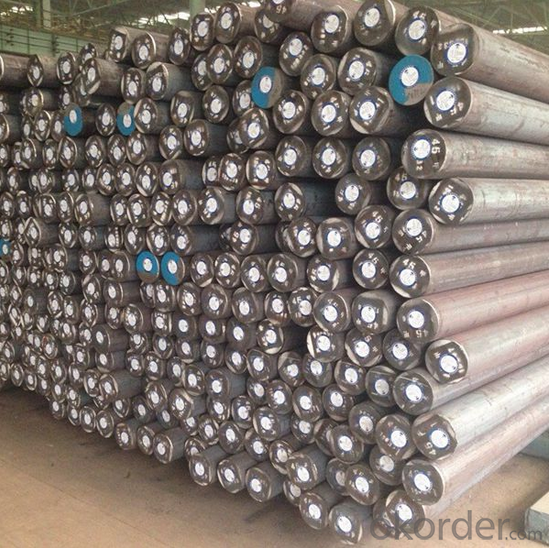
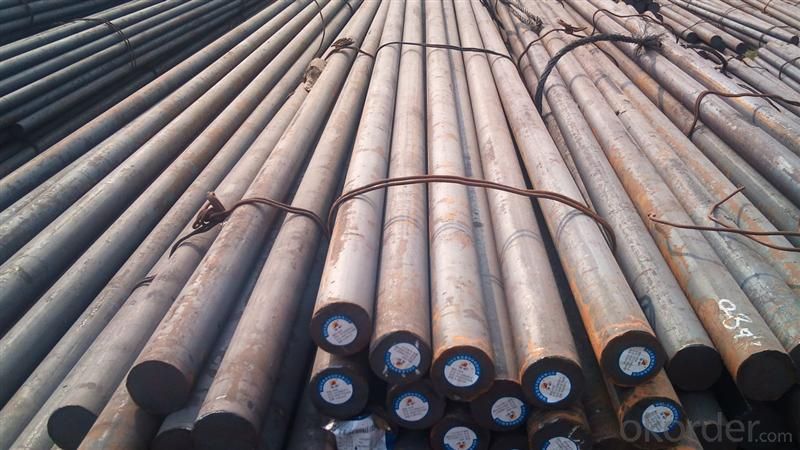
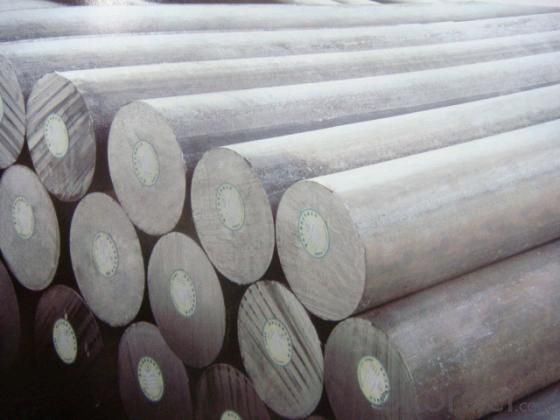
- Q: What are the applications of special steel in the aerospace sector?
- Special steel has various applications in the aerospace sector due to its exceptional properties. It is used for manufacturing critical components such as turbine blades, landing gear, and structural parts. The high strength, corrosion resistance, and heat resistance of special steel make it ideal for withstanding extreme conditions experienced during flight. Additionally, its lightweight nature contributes to fuel efficiency and overall performance improvement in aircraft.
- Q: Can special steel be used in the battery manufacturing industry?
- Yes, special steel can be used in the battery manufacturing industry. Special steel is often used in battery production for various purposes, such as in the construction of battery casings, terminals, and other components. Its high strength, durability, and resistance to corrosion make it suitable for ensuring the safety and longevity of batteries.
- Q: What are the different joining methods used for special steel?
- The different joining methods used for special steel include welding, brazing, soldering, and mechanical fastening.
- Q: Can special steel be used in the aerospace industry?
- Yes, special steel can be used in the aerospace industry. Special steel alloys, such as stainless steel or titanium alloys, are commonly utilized in the aerospace industry due to their high strength-to-weight ratio, corrosion resistance, and ability to withstand extreme temperatures and pressures. These properties make special steel suitable for various components in aircraft and spacecraft manufacturing, including structural elements, engine parts, landing gears, and fasteners.
- Q: What are the main applications of special steel in the chemical processing industry?
- Special steel is widely used in the chemical processing industry due to its exceptional properties such as corrosion resistance, high strength, and heat resistance. It finds applications in various components and equipment such as reactors, heat exchangers, pipes, valves, and fittings. These materials are crucial for handling corrosive chemicals, withstanding high temperatures and pressures, and ensuring the integrity and safety of chemical processing operations.
- Q: How does special steel contribute to the longevity of products?
- There are several ways in which special steel contributes to the longevity of products. To begin with, its exceptional strength and durability are well-known. Special steel is specifically designed to endure extreme conditions, such as high temperatures, pressure, and corrosive environments. This makes it highly suitable for use in various industries, including aerospace, automotive, and construction. The remarkable strength of special steel enables products to bear heavy loads and resist deformation, ensuring they remain intact and functional for a prolonged period of time. For example, in the construction industry, special steel is frequently employed in structural components like beams and columns, which provide crucial support and stability to buildings over many years. Furthermore, special steel possesses excellent resistance to wear and abrasion. It can endure constant friction, impact, and contact with other materials without significant deterioration. This characteristic is vital in industries where products are subjected to continuous use, such as machinery, tools, and equipment. The utilization of special steel in these applications guarantees that the products remain in good working condition for an extended period, reducing the need for frequent repairs or replacements. Additionally, special steel exhibits exceptional resistance to corrosion, making it highly resistant to rust and other forms of corrosion. This property is especially advantageous in products exposed to harsh environments or chemicals, like marine vessels, pipelines, and chemical processing equipment. Through the utilization of special steel, manufacturers can significantly prolong the lifespan of these products, minimizing the risk of failure or breakdown due to corrosion. In conclusion, special steel contributes to the longevity of products through its provision of superior strength, durability, wear resistance, and corrosion resistance. Its extraordinary properties enable products to withstand harsh conditions, heavy loads, and continuous use, guaranteeing that they remain functional and reliable for an extended period. By incorporating special steel into their designs, manufacturers can greatly enhance the lifespan of their products, leading to cost savings, improved reliability, and customer satisfaction.
- Q: How does special steel perform in high-temperature oxidation resistance?
- Special steel is specifically designed to have excellent high-temperature oxidation resistance. It is able to withstand prolonged exposure to high temperatures without undergoing oxidation, ensuring its structural integrity and performance are maintained even in extreme conditions.
- Q: What are the properties of spring steel?
- Some properties of spring steel include high strength, excellent elasticity, good fatigue resistance, and the ability to withstand repeated bending or twisting without deformation or breaking. It also has good corrosion resistance and is often used in applications where durability and flexibility are required, such as springs, suspension systems, and cutting tools.
- Q: How does special steel contribute to the automotive parts industry?
- Special steel plays a crucial role in the automotive parts industry by providing enhanced strength, durability, and performance to various components used in vehicles. With its unique properties, special steel helps in improving the overall safety, reliability, and efficiency of automobiles. One of the key contributions of special steel to the automotive parts industry is its ability to withstand high temperatures, pressures, and extreme conditions. This makes it ideal for manufacturing engine parts such as crankshafts, camshafts, and connecting rods, which are subject to intense mechanical stress and heat. Special steel ensures that these critical components can endure the demanding conditions of combustion engines, resulting in improved engine performance and longevity. Another significant contribution of special steel is its corrosion resistance. Automotive parts are exposed to various corrosive elements like moisture, chemicals, and road salt. Special steel enables the production of corrosion-resistant parts such as exhaust systems, suspension components, and brake rotors, which are vital for maintaining the structural integrity and safety of vehicles over time. Moreover, special steel offers exceptional formability and weldability, allowing manufacturers to produce complex automotive parts with precision and ease. This versatility makes it possible to create lightweight yet strong components like chassis, body panels, and suspension arms, which contribute to fuel efficiency, handling, and overall vehicle performance. Furthermore, special steel's high tensile strength and toughness contribute to the safety of vehicles by ensuring the structural integrity of safety-critical parts such as steering columns, seat frames, and roll bars. These components play a vital role in protecting occupants during accidents and collisions, making special steel an essential material for enhancing overall vehicle safety. In conclusion, special steel's unique properties and characteristics significantly contribute to the automotive parts industry. Its strength, durability, corrosion resistance, formability, and weldability make it an ideal material for manufacturing critical components in automobiles. By incorporating special steel into various parts, vehicles can achieve improved performance, safety, and reliability while meeting the demands of modern automotive standards.
- Q: How does special steel play a role in the defense sector?
- The defense sector heavily relies on special steel because of its unique properties and characteristics, which make it highly suitable for various applications. Firstly, special steel possesses exceptional strength and durability, making it perfect for the manufacturing of military vehicles, armored personnel carriers, and tanks. These vehicles necessitate materials that can withstand high impacts, resist deformation, and provide protection against enemy attacks. Additionally, special steel finds its use in the production of military aircraft and naval vessels. Its high strength-to-weight ratio enables the construction of lightweight yet sturdy structures, allowing aircraft to carry heavy payloads and naval vessels to navigate through harsh conditions. Furthermore, special steel's resistance to corrosion makes it ideal for marine environments, ensuring the long lifespan and reliability of naval assets. Furthermore, special steel is utilized for the manufacturing of weapons and ammunition. Its hardness and toughness make it suitable for producing firearm barrels, armor-piercing projectiles, and other critical components. The ability of special steel to withstand extreme pressures, temperatures, and impact forces guarantees the accuracy, reliability, and effectiveness of military weaponry. Moreover, special steel is employed in the defense sector for the production of communication and surveillance equipment. Its electromagnetic properties allow for the creation of radar systems, antennas, and electronic enclosures, which are crucial for military operations. Special steel's resistance to electromagnetic interference ensures the integrity and security of communication systems, thereby enhancing the overall efficiency and effectiveness of defense operations. In conclusion, special steel plays a vital role in the defense sector by providing the necessary strength, durability, corrosion resistance, and electromagnetic properties for various applications. Its utilization in military vehicles, aircraft, naval vessels, weapons, and communication equipment enhances the overall capabilities, effectiveness, and safety of defense forces, thereby ensuring national security.
Send your message to us
Special Steel Scm440 Aisi 4140 Steel CNBM
- Loading Port:
- Tianjin
- Payment Terms:
- TT OR LC
- Min Order Qty:
- 25 m.t.
- Supply Capability:
- 50000 m.t./month
OKorder Service Pledge
OKorder Financial Service
Similar products
Hot products
Hot Searches
Related keywords
